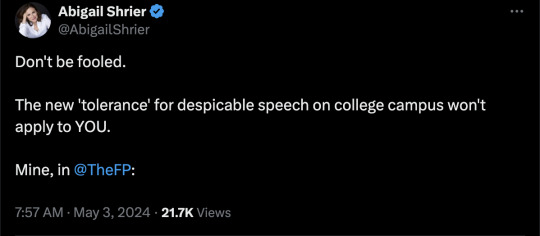#Free Expression
Explore tagged Tumblr posts
Text

This is stolen from a post trying to correlate pride month with Satan.
Firstly.
Don’t make it so fkn cool! I mean. That sh*t is fkn metal AF!! If you’re trying to scare kids away from the pride festivities, you’re not doing a good job because that is psychedelic as sh*t, and looks bad ass!!
Secondly. 
Imagine following a religion. A religion that says to love thy neighbor as you do thyself. A religion who speaks of being kind to the stranger (immigrant) because you too were once a stranger in this land. A religion that says it’s easier for a camel to go through the eye of a needle than for a rich man to get into heaven. A religion whose messiah washed the feet of beggars, bedded with lepers, took care of the sick and homeless, exuded humility, said, judge not lest ye be judged thyself, and what you took from that is gay people are satanic….
Jesus was a liberal. He cared and loved all gods children. Whether Jewish, Muslim, black, white, prostitute, beggar, gay or straight. Yet far too many so called Christians say so much about what god said so little about, and so little about what had said so much about.
There is passage after passage about talking care of the stranger, the traveler, the immigrant, yet the heretic Christians shun them.
There is passage after passage about how only god can judge for it is only god who is without sin. Yet the blasphemy from church congregations judges bodily autonomy of strangers they no nothing about.
There is passage after passage about taking care of each other, loving thy neighbor, sacrificing for the good of others without a personal connection to them or gain from them. Yet our veterans go homeless and hungry, mental health crises go untreated, the sick get denied healthcare.
The hypocrisy is so unchristlike, the teachings obviously ignored.
This pride let’s be louder, brighter, kinder, happier, friendlier, and yes, gayer than ever!!
Love overcomes hate! Kindness is greater than cruelty! And being true to oneself, is better than living a hypocritical existence.
Happy pride my lovely freaks and weirdos!! 🏳️🌈
#pride month#gay pride#pride#june is pride month#trans pride#trump is a threat to democracy#politics#traitor trump#donald trump#republicans#democracy#freedom#free speech#free expression#free press#maga 2024#maga#maga morons#crooked donald#impeach trump#no kings#gop hypocrisy#gop#republican assholes#democrats#freedom for all#illegal immigration#immigrants#christianity#jesus christ
88 notes
·
View notes
Text
Every internet fight is a speech fight

THIS WEEKEND (November 8-10), I'll be in TUCSON, AZ: I'm the GUEST OF HONOR at the TUSCON SCIENCE FICTION CONVENTION.

My latest Locus Magazine column is "Hard (Sovereignty) Cases Make Bad (Internet) Law," an attempt to cut through the knots we tie ourselves in when speech and national sovereignty collide online:
https://locusmag.com/2024/11/cory-doctorow-hard-sovereignty-cases-make-bad-internet-law/
This happens all the time. Indeed, the precipitating incident for my writing this column was someone commenting on the short-lived Brazilian court order blocking Twitter, opining that this was purely a matter of national sovereignty, with no speech dimension.
This is just profoundly wrong. Of course any rules about blocking a communications medium will have a free-speech dimension – how could it not? And of course any dispute relating to globe-spanning medium will have a national sovereignty dimension.
How could it not?
So if every internet fight is a speech fight and a sovereignty fight, which side should we root for? Here's my proposal: we should root for human rights.
In 2013, Edward Snowden revealed that the US government was illegally wiretapping the whole world. They were able to do this because the world is dominated by US-based tech giants and they shipped all their data stateside for processing. These tech giants secretly colluded with the NSA to help them effect this illegal surveillance (the "Prism" program) – and then the NSA stabbed them in the back by running another program ("Upstream") where they spied on the tech giants without their knowledge.
After the Snowden revelations, countries around the world enacted "data localization" rules that required any company doing business within their borders to keep their residents' data on domestic servers. Obviously, this has a human rights dimension: keeping your people's data out of the hands of US spy agencies is an important way to defend their privacy rights. which are crucial to their speech rights (you can't speak freely if you're being spied on).
So when the EU, a largely democratic bloc, enacted data localization rules, they were harnessing national soveriegnty in service to human rights.
But the EU isn't the only place that enacted data-localization rules. Russia did the same thing. Once again, there's a strong national sovereignty case for doing this. Even in the 2010s, the US and Russia were hostile toward one another, and that hostility has only ramped up since. Russia didn't want its data stored on NSA-accessible servers for the same reason the USA wouldn't want all its' people's data stored in GRU-accessible servers.
But Russia has a significantly poorer human rights record than either the EU or the USA (note that none of these are paragons of respect for human rights). Russia's data-localization policy was motivated by a combination of legitimate national sovereignty concerns and the illegitimate desire to conduct domestic surveillance in order to identify and harass, jail, torture and murder dissidents.
When you put it this way, it's obvious that national sovereignty is important, but not as important as human rights, and when they come into conflict, we should side with human rights over sovereignty.
Some more examples: Thailand's lesse majeste rules prohibit criticism of their corrupt monarchy. Foreigners who help Thai people circumvent blocks on reportage of royal corruption are violating Thailand's national sovereignty, but they're upholding human rights:
https://www.vox.com/2020/1/24/21075149/king-thailand-maha-vajiralongkorn-facebook-video-tattoos
Saudi law prohibits criticism of the royal family; when foreigners help Saudi women's rights activists evade these prohibitions, we violate Saudi sovereignty, but uphold human rights:
https://www.bbc.com/news/world-middle-east-55467414
In other words, "sovereignty, yes; but human rights even moreso."
Which brings me back to the precipitating incidents for the Locus column: the arrest of billionaire Telegram owner Pavel Durov in France, and the blocking of billionaire Elon Musk's Twitter in Brazil.
How do we make sense of these? Let's start with Durov. We still don't know exactly why the French government arrested him (legal systems descended from the Napoleonic Code are weird). But the arrest was at least partially motivated by a demand that Telegram conform with a French law requiring businesses to have a domestic agent to receive and act on takedown demands.
Not every takedown demand is good. When a lawyer for the Sackler family demanded that I take down criticism of his mass-murdering clients, that was illegitimate. But there is such a thing as a legitimate takedown: leaked financial information, child sex abuse material, nonconsensual pornography, true threats, etc, are all legitimate targets for takedown orders. Of course, it's not that simple. Even if we broadly agree that this stuff shouldn't be online, we don't necessarily agree whether something fits into one of these categories.
This is true even in categories with the brightest lines, like child sex abuse material:
https://www.theguardian.com/technology/2016/sep/09/facebook-reinstates-napalm-girl-photo
And the other categories are far blurrier, like doxing:
https://www.kenklippenstein.com/p/trump-camp-worked-with-musks-x-to
But just because not every takedown is a just one, it doesn't follow that every takedown is unjust. The idea that companies should have domestic agents in the countries where they operate isn't necessarily oppressive. If people who sell hamburgers from a street-corner have to register a designated contact with a regulator, why not someone who operates a telecoms network with 900m global users?
Of course, requirements to have a domestic contact can also be used as a prelude to human rights abuses. Countries that insist on a domestic rep are also implicitly demanding that the company place one of its employees or agents within reach of its police-force.
Just as data localization can be a way to improve human rights (by keeping data out of the hands of another country's lawless spy agencies) or to erode them (by keeping data within reach of your own country's lawless spy agencies), so can a requirement for a local agent be a way to preserve the rule of law (by establishing a conduit for legitimate takedowns) or a way to subvert it (by giving the government hostages they can use as leverage against companies who stick up for their users' rights).
In the case of Durov and Telegram, these issues are especially muddy. Telegram bills itself as an encrypted messaging app, but that's only sort of true. Telegram does not encrypt its group-chats, and even the encryption in its person-to-person messaging facility is hard to use and of dubious quality.
This is relevant because France – among many other governments – has waged a decades-long war against encrypted messaging, which is a wholly illegitimate goal. There is no way to make an encrypted messaging tool that works against bad guys (identity thieves, stalkers, corporate and foreign spies) but not against good guys (cops with legitimate warrants). Any effort to weaken end-to-end encrypted messaging creates broad, significant danger for every user of the affected service, all over the world. What's more, bans on end-to-end encrypted messaging tools can't stand on their own – they also have to include blocks of much of the useful internet, mandatory spyware on computers and mobile devices, and even more app-store-like control over which software you can install:
https://pluralistic.net/2023/03/05/theyre-still-trying-to-ban-cryptography/
So when the French state seizes Durov's person and demands that he establish the (pretty reasonable) minimum national presence needed to coordinate takedown requests, it can seem like this is a case where national sovereignty and human rights are broadly in accord.
But when you consider that Durov operates a (nominally) encrypted messaging tool that bears some resemblance to the kinds of messaging tools the French state has been trying to sabotage for decades, and continues to rail against, the human rights picture gets rather dim.
That is only slightly mitigated by the fact that Telegram's encryption is suspect, difficult to use, and not applied to the vast majority of the communications it serves. So where do we net out on this? In the Locus column, I sum things up this way:
Telegram should have a mechanism to comply with lawful takedown orders; and
those orders should respect human rights and the rule of law; and
Telegram should not backdoor its encryption, even if
the sovereign French state orders it to do so.
Sovereignty, sure, but human rights even moreso.
What about Musk? As with Durov in France, the Brazilian government demanded that Musk appoint a Brazilian representative to handle official takedown requests. Despite a recent bout of democratic backsliding under the previous regime, Brazil's current government is broadly favorable to human rights. There's no indication that Brazil would use an in-country representative as a hostage, and there's nothing intrinsically wrong with requiring foreign firms doing business in your country to have domestic representatives.
Musk's response was typical: a lawless, arrogant attack on the judge who issued the blocking order, including thinly veiled incitements to violence.
The Brazilian state's response was multi-pronged. There was a national blocking order, and a threat to penalize Brazilians who used VPNs to circumvent the block. Both measures have obvious human rights implications. For one thing, the vast majority of Brazilians who use Twitter are engaged in the legitimate exercise of speech, and they were collateral damage in the dispute between Musk and Brazil.
More serious is the prohibition on VPNs, which represents a broad attack on privacy-enhancing technology with implications far beyond the Twitter matter. Worse still, a VPN ban can only be enforced with extremely invasive network surveillance and blocking orders to app stores and ISPs to restrict access to VPN tools. This is wholly disproportionate and illegitimate.
But that wasn't the only tactic the Brazilian state used. Brazilian corporate law is markedly different from US law, with fewer protections for limited liability for business owners. The Brazilian state claimed the right to fine Musk's other companies for Twitter's failure to comply with orders to nominate a domestic representative. Faced with fines against Spacex and Tesla, Musk caved.
In other words, Brazil had a legitimate national sovereignty interest in ordering Twitter to nominate a domestic agent, and they used a mix of somewhat illegitimate tactics (blocking orders), extremely illegitimate tactics (threats against VPN users) and totally legitimate tactics (fining Musk's other companies) to achieve these goals.
As I put it in the column:
Twitter should have a mechanism to comply with lawful takedown orders; and
those orders should respect human rights and the rule of law; and
banning Twitter is bad for the free speech rights of Twitter users in Brazil; and
banning VPNs is bad for all Brazilian internet users; and
it’s hard to see how a Twitter ban will be effective without bans on VPNs.
There's no such thing as an internet policy fight that isn't about national sovereignty and speech, and when the two collide, we should side with human rights over sovereignty. Sovereignty isn't a good unto itself – it's only a good to the extent that is used to promote human rights.
In other words: "Sovereignty, sure, but human rights even moreso."

If you'd like an essay-formatted version of this post to read or share, here's a link to it on pluralistic.net, my surveillance-free, ad-free, tracker-free blog:
https://pluralistic.net/2024/11/06/brazilian-blowout/#sovereignty-sure-but-human-rights-even-moreso

Image: © Tomas Castelazo, www.tomascastelazo.com (modified) https://commons.wikimedia.org/wiki/File:Border_Wall_at_Tijuana_and_San_Diego_Border.jpg
CC BY-SA 4.0 https://creativecommons.org/licenses/by-sa/4.0/
#speech#free speech#free expression#crypto wars#national sovereignty#elon musk#twitter#blocking orders#pavel durov#telegram#lawful interception#snowden#data localization#russia#brazil#france#cybercrime treaty#bernstein#eff#malcolm turnbull#chat control
121 notes
·
View notes
Text
One of the great things about Tumblr is watching people be unabashedly themselves, and taking notes in hopes I can reach this level of free expression some day.
4 notes
·
View notes
Text
With video game Stellar Blade was so glad game designers in South Korea ignored neo-Puritans upset over character design.

Is better way for peoples in other countries to not accept tyranny from some.
12 notes
·
View notes
Text
Thank You All Great Spirits (Thank You For Your Love) - Nate Mercereau
from plays two versions of a melody by Tisziji Muñoz
#Nate Mercereau#Surya Botofasina#Carlos Niño#Will Logan#bandcamp#jazz#sort of#free expression#ecstatic#gratitude
4 notes
·
View notes
Text
In face of hospital and ambulance bombing, Tumblr is censoring tags to help Israel manipulate public opinions. Neat.
Did Israel pay you or are you volunteering? You must love genocide a whole lot. But this is too obvious, you idiots. The people will remember you.
And to everyone, I hope you understand censoring political opinions will always eventually lead to this: stifling communication and information flow and cause the world to go downhill. We need better internet.
Freedom of Speech is the foundation of all other freedoms.
#public manipulation#censorship#free speech#freedom of speech#free expression#freedom of expression#social media#web3#web 3.0#free palestine#gaza#israel#palestine#from the river to the sea palestine will be free
22 notes
·
View notes
Text
"Se que fui malo y ahora lo se...
Te perdi por tonto y por tonto no estoy bien"

#love#feelings#letras tristes#fuck life#sad people#life#versos#amor imposible#chile#santiago#verso libre#free expression#freestyle#amor en silencio#amor no correspondido#the secret history#secret life#santiago la florida
6 notes
·
View notes
Text

By: Abigail Shrier
Published: May 3, 2024
Frat parties with offensive themes are swiftly punished. But publicly contemplate murdering Zionists? That’s a different story.
A police officer who pulls over speeding black motorists—and only black motorists—isn’t protecting “law and order.” He’s engaging in invidious discrimination. So too the university administrators who suddenly discover they are free speech absolutists only when student protesters call for the death of their Jewish classmates.
In January, a junior at Columbia University, Khymani James, told a disciplinary committee at the school that Zionists “don’t deserve to live.” “Be grateful that I’m just not going out and murdering Zionists,” he instructed them. Then, James headed back to campus, scot-free. (If he hadn’t also posted a recording of the meeting to his social media site, discovered four months later, there might never have been any repercussions at all.)
It was the sort of stunt a star quarterback for the football team could have gotten away with a generation or two ago, when college coaches might have been eager to sweep sexual assault allegations under the rug. Or the son of a major donor to the university. James apparently enjoys a level of privilege every bit as sacrosanct: as a leader of the pro-Palestinian encampment at an Ivy League school, he could threaten Jewish students at his pleasure, university codes of conduct be damned.
If there was ever doubt whether calling for the genocide of Jews violates Columbia’s code of conduct, on April 23, Rep. Suzanne Bonamici (D-OR) asked four Columbia University professors and administrators this explicitly. Every one of them said: “Yes, it does.” As for the encampments, they violate Columbia’s Rules of University Conduct, disruptive behavior standards, university policy regarding “tenting,” disciplinary rules against “vandalism/damage to property,” unauthorized “access/egress” rules as well as Columbia’s policy against harassment, according to a Notice to Encampment circulated by the university.
In the last two weeks, self-proclaimed pro-Palestinian protesters have set up encampments at dozens of American universities. Heedless of university restrictions against intimidation and harassment, they demonstrate where, when, and how they like. They cry “Go back to Poland,” “baby killers,” and “globalize the Intifada” at Jewish students. They wave the flags of designated terrorist groups, like Hezbollah and the Popular Front for the Liberation of Palestine, and hold up signs that beckon “Al-Qasam’s Next Targets,” with an arrow pointing at Jewish counterprotesters. (Al-Qassam is the wing of Hamas that carried out the October 7 massacre.)
On campuses that have—for a decade or more—repeated ad nauseam that priority one was the creation of a “safe, inclusive, supportive, and fair” community, the pro-Palestinian demonstrators wave Hezbollah flags, wear Hamas headbands, and conceal their faces with masks. They ignore all time, place, and manner restrictions on student demonstrations set by their schools, and refuse all demands from the universities to take down their tents or to move their protests elsewhere. And at Columbia, until April 30, when protesters took over Columbia’s Hamilton Hall and the NYPD was at last called in, they almost got away with it.
At UCLA, protesters blocked students from entering the library during the midterms, asking those who wished to enter: “Are you a Zionist?” After a Jewish girl was reportedly beaten unconscious by pro-Palestinian protesters, pro-Israel counterprotesters at UCLA arrived in masks and hoodies, shooting off fireworks, firing tear gas, and throwing objects at the pro-Hamas protesters and attempting to physically destroy the encampments. Only then did UCLA call in the police to remove the encampments.
Instead of immediately suspending the pro-Hamas protesters for breaking university rules, for weeks, university administrations instead chose to “negotiate” with the rule-breakers. At Columbia, the administration offered to review its policy on “socially responsible investing” (read: divesting from the world’s only Jewish state), and offered to “make investments in health and education in Gaza.” At Brown, the administration promised protesters that they would put divestment from Israel on the agenda. At Northwestern, the administration meekly tossed rewards, including the promise to establish a full-ride scholarship for Palestinian students and guaranteed faculty jobs for Palestinian academics.
At Columbia, protesters rejected the offers, knowing they had the upper hand. When police arrived to break up the encampments, Columbia faculty in orange vests linked arms to form a human wall against the police, shielding the rule-breakers.

[ Faculty of Columbia University link arms to protect students inside threatened with suspension if they refused to voluntarily dismantle the pro-Palestine encampment on campus by 2 pm on April 29, 2024. ]
The lengths administrators have gone to placate, encourage, and embolden the pro-Hamas protesters in the past weeks provide a signal reminder that there are at least two sets of rules governing elite universities today: one for the favored, protected class; the other for everyone else. And in case anyone has any doubt which category Jewish students fall into, the unwillingness of universities to enforce their own codes of conduct against pro-Hamas protesters in the months since October 7 should disabuse them.
Consider how racist speech (or even racially insensitive speech) has been received on virtually any major American campus for decades.
In 2017, an anonymous jerk put flyers up around American University’s campus. The flyers displayed a Confederate flag, a stem of raw cotton, and read “Huzzah for Dixie” and the like.
American University immediately launched into emergency response mode, treating the flyers as a criminal threat. It published CCTV video and solicited help from the public in identifying the man who posted the flyers. An all points bulletin called “CRIME ALERT” went out for the man’s arrest. The New York Times covered the incident; the words “free speech” do not appear once in the article. Instead, it approvingly noted that in a previous incident—when bananas were found hanging from nooses around campus—the FBI had been called to investigate.
Nor could I find any evidence of any free speech organization rushing to defend the man who posted the flyers—nor the racist provocateurs in any of dozens of similar incidents. No prominent “free speech absolutists” appear to have considered the expressive value of “Huzzah for Dixie” worth defending. Nor did pundits claim that inviting law enforcement to investigate such acts of hate—i.e., “calling the police on your own students”—was in any sense inappropriate or disproportionate. In almost every single case—at schools like Stanford, Johns Hopkins, Michigan State, University of Florida, Duke, and American University—where a symbolic noose was discovered on a campus, it was treated as a criminal threat, never as speech.
After the Huzzah for Dixie flyers were found, the president of American University quickly issued a statement: “I ask you to join me in standing together and show that we will not be intimidated. AU will respond strongly to attempts designed to harm and create fear,” she wrote. “When one of us is attacked, all of us are attacked.”
Today, in the face of months of bloodthirsty cries aimed at Jewish students (“globalize the Intifada”), university presidents line up to assure the protesters of their right to free speech.
In the abstract, if “Huzzah for Dixie” is worth the full mobilization of university resources and law enforcement, then waving the flag of a terrorist group, or writing “burn you filthy zio” to a student chat, or telling Jewish students to “go back to Poland” where millions of Jews were murdered in gas chambers, or pulling down the American flag over a statue of John Harvard and replacing it with the Palestinian flag, or painting “Ziosgetfuckt” on UPenn’s statue of Ben Franklin, or calling Jews “Hitler’s children”—all insults hurled at Jews on campus—are at least as menacing.
But in practice, the two types of incidents—rather, the two targets of the incidents—are treated entirely differently. Punishment is meted out swiftly and mercilessly, and with no consideration for free speech principles, any time Confederate flag flyers are posted, any time students hold culturally insensitive themed frat parties, any time colleges uncover student use of the N-word while in high school (or even a word in Mandarin that sounds like the N-word), or even when students or faculty make the familiar conservative argument that affirmative action sets black students up to fail. Rinse and repeat and repeat.
Speech on college campuses has been stultifyingly narrow—and very far from free—for decades. That pro-Hamas students cheer freely for “intifada” doesn’t make it any freer now. The fact that certain students are allowed to call for the death of their Jewish classmates does not herald a new era of free expression. It only underscores that some bigotries enjoy the official sanction of these schools, and are accepted, tolerated, and rewarded with special dispensations and, indeed, goodies.
Use of the N-word on campus or misgendering a classmate will no doubt be met with as swift punitive consequences as they have been for decades, as have a vast and more minute array of “microaggressions.” I invite anyone who doubts this to parade through any of our elite campuses with insulting cartoon depictions of the Prophet Muhammad.
After weeks of violent, destructive protest, which left campuses trashed and buildings damaged and graffitied, administrators have at last begun to enforce their own rules and call in the police. Perhaps they felt they had no choice: commencement ceremonies loom and lawsuits, recently filed by Jewish students, are on the way.
But watch the marble carefully as university administrators spin the cups. When a favored group is attacked, they discover a “community safety” concern with remarkable alacrity. When it’s a disfavored group, suddenly the cup reveals “free expression.” The game is fixed, and the administrators show their hands. “Community safety,” or was it “free speech”? Surprise! They don’t believe in either.
#Abigail Shrier#free speech#freedom of speech#pro hamas#hamas supporters#hamas#antisemitism#free expression#censorship#hypocrisy#student protests#student violence#palestine#pro palestine#religion is a mental illness
4 notes
·
View notes
Text
Good Bye Tumblr
Unfortunately as time goes by tumblr is going the way of many other social media sites. Charging money for clout and forcing sign ups for someone just to read your blog. They have thrown around goofy community guidelines that heavily restrict free speech , expression, and access to information or opinions. I am in the process of switching over to this site where I'll be posting new and old content from various places. It was good while it lasted and if things change, maybe ill do a revisit someday.
RIP TUMBLER
-------------New Blog Below -------------
3 notes
·
View notes
Text






#my art#original content#throwback#art#my photos#witchy#witchcraft#my space#sacred space#altar#triple moon#owls#Ginesthoi#make it so#painting#woodcraft#colorful#free expression#explore#myself#thoth#nyx#dragon#ankh#symbols#my projects#throw back#pagan witch#pagan#my practice
3 notes
·
View notes
Text
Banned text
I went to the local library, and didn't actually find much I was excited about; the selection was so poor compared to Amazon. But of course there were a trillion copies of Fahrenheit 451, and I have like no memory of the plot, so I thought I'd go ahead and give it a read.
I read Fahrenheit 451 many years ago in high school (back in the 20th century), but I struggled to understand it the way I struggled to understand normal people. I was like Clarisse, except they made me go to school and didn't let me have any therapy for it. And I couldn't understand where the other characters in the book were coming from, or why they acted like automata or got trapped in their mundane lives, any better than I understood my classmates. But Clarisse was connected to nature and was a rejection of modern technology that had already taken over, while I was using technology that hadn't become a monster yet. And because of the "nature = good, technology = bad" theme that all the teachers very much wanted us to notice, I was mostly annoyed.
I was seventeen in the days of the very early internet, like some kind of settler in a digital wild, before social media existed. Every day I would want to get home away from the school social treadmill with its structured activities, and I'd go on the internet-- which was mostly text those days, all words, no videos, few photos-- and I'd talk to the very rare other teenagers who rejected their school lives and went on the internet to make friends with distant teenagers who didn't fit in like me, the uncool outcast kids who wanted to reach out and touch someone that wasn't swept up in their prescribed lives of social competition for peers' admiration.
Downstairs, my mother sat hypnotized by the glow of TV sitcoms, my father slaved away at the treadmill of capitalism, and I escaped through a thread of text, spinning out over the phone line and projected far away into the ether. My words like a cry into the darkness were finally sent somewhere meaningful, crossing vast distances of space to talk to other stars like me that burned, that did more than just orbit the culture that was fed to us without reaction, like a cold hard rock. The new technology that now traps people was, for me, a line of escape from that trap. I used computers to connect with other teenagers on the level I craved, one that made my classmates mock me for thinking and caring too deeply.
So when the experts insisted we all had to turn off our electronics and go out and touch grass, as if screen time were the destroyer of thought, I was so angry-- touching grass was part of what the mass majority was doing with their sports and their school dances. What was digital and abstract and "unreal" to them was my lifeline to my friends, to the other rare kids like me out there, so scattered and few, who actually thought and lived.
Now I get it, now that the world has changed and everybody's online using the internet just like they used the TV and everything else. But at the time it was being presented to me (presented, of course, by pop culture that had digested it, memetic associations and symbolic settings that had filtered into other media) as a bunch of false equations: "Technology =/= reading, or sharing deep ideas. Technology =/= real contact with real people. Face-to-face contact, and nature, are inherently more deep and connecting than any use of technology." These were the opposite of my experience. But they were formulated by people who only dimly understood the book's concerns: people who vibed with its insight that the experience of life was easily lost in the hypnotic content delivery of entertainment, but didn't have its insight as to why. The formula was then blindly taught by concerned parents and schools and other adults who thought themselves wise, to keep me away from the internet, which was my lifeline out of the endless prescribed cycle of school and work and the expectation that I would make money and marry and have children and do the same thing to them.
Go to school, move out and live on my own, go to work, select a partner, produce another generation that will do the same. It seemed so painfully meaningless, like the point was just to keep going on with the program-- which, of course, included plenty of activities that were supposed to involve enjoying the outdoors. Amusement parks, the beach, travel, hiking, all these things were prescribed for our health, so we had to go and labour at them (away from my precious internet connection with other distant misfits who actually connected with me).
I'm allergic to grass. If I sit in it my eyes and nose will stream with so much water and mucus that I can't even focus on anything other than my itching and distress. "Go out and touch grass" means anything to me but "pay attention to the world around me"; it means to be unable to focus on anything other than the overwhelming concerns of my bodily function, to feel unwell and trapped in my meatsuit, and unable to see. "Go out and touch grass" meant "obsess over your meat trap, like you're supposed to do." I wanted to dissolve into a stream of digital truth and escape my physical confines. Being a person didn't mean living in my body (my teenage desirable girl's body, precious currency of social attention, with its nascent disabilities just strong enough to make physical life unpleasant.) It meant being out of my body, being pure consciousness, focusing on meaning and, yes, emotion, physical as those chemicals actually are; being allowed to choose and guide my attention, and to care about whatever I wanted, and not distill all of the meaning of living down to the officially "healthy" program that society had selected for me.
Yes, the internet has become a hypnotic trap. But the problem isn't "screen time", the problem is when we use our screen time all wrong. Bradbury would have been happy to see that we participate with our own thoughts and use our own words, and that we constantly learn things we didn't expect to encounter. We're reading, and not only that, we're reading the thoughts and feelings of everybody, not just establishment-curated popular content. Unfortunately, a lot of those thoughts and feelings just echo the crap that's already been fed to us by school-work-society.
The problem isn't the medium, and the thing to be cherished isn't books. Before social media took over our lives, pundits were afraid that nobody would be able to read or write due to television. That did not turn out to be the problem-- we now read and write more text than anyone ever has in the whole history of civilization. The problem is that it's easy to turn off our brains and let content be delivered to us without any effort, rather than engaging with it by choice and direction. It doesn't matter whether we do that through radio, or TV, or the internet, or old dime-store comic books. Experts have finally stopped worrying that the next generation won't read, now that we see on twitter that text can be used to waste time just like anything else.
What concerns me is that we won't think about what we've read. That we won't digest it and think how it applies, or doesn't apply, to our lives. That we won't investigate for ourselves, but accept the word of the experts on whether engaging with it is healthy or not. That we won't look for whether it's true or untrue in our experience, but simply repeat it in situations that are superficially similar-- and then arbitrate whether it's healthy for other people by the metric of what they're looking at, not by what they choose to do with it next. Bradbury used the metaphor of a society that said TV was good and books were bad. The characters choose what to burn and what to broadcast for other people, what's good for society and what's bad for it, by judging the content that others take in, and making assumptions that it affects everyone a certain way. The mistake is in losing the individuality of how it affects everyone differently. Even Fahrenheit 451 itself instills caution in some people, self-satisfaction in others, misidrected paranoia in others, speculative wonder in others, and sleep in those who aren't interested in social issues.
The trap is not technology, but rather that we will only use it to do Normal things that we are Allowed to do. The trap is believing that certain media cause everyone who engages to have bad reactions rather than good ones, instead of treating each person as an individual case that could go either way. The trap is accepting that certain things are forbidden-- that we shouldn't read or think them at all, not even experimentally, not even long enough to know why, or whether, they are wrong. If we don't look at them because we fear they will harm us, we'll lose what they are supposed to do, which is warn us about the real harm. If we avoid content based on what the experts claim it will do to us, we will lose the engagement of those most interested in using tools in a healthy way. And if we shame, forbid or otherwise prevent others from engaging with the medium of their choice, then someone who would have actually needed it to step beyond their prescribed social boundaries will lose their lifeline.
#fahrenheit 451#banned books#technology#ray bradbury#censorship#internet#critical thinking#free expression#reading#reader#books#screen time#chronically online#fandom#writing
2 notes
·
View notes
Text
HEAR THE WHISPERS OF YOUR ANCESTORS, CHILDREN.
THE DARK TIMES CAN AND WILL TRY TO COME BACK.
DO NOT LET YOURSELF BE FOOLED BY THE LIES!!!
IT'S NOT FOR YOUR SAFETY ITS FOR THEIR CONTROL!!!
DON'T BE FOOLED!!!! DON'T BE DECEIVED!!!
DON'T LET THEM TAKE WHAT HAVE BEEN THE LAST BASTION!!!!



42K notes
·
View notes
Text
Ríe junto a mi.
No dejes que te haga sufrir.
Aquí estaré para ti..

#love#feelings#fuck life#sad people#life#versos#letras tristes#verso libre#freestyle#free expression#lovers#amor imposible#happiness#tumblr chilenito#chile tumblr#chile#santiago la florida#no te he olvidado#olvidar#forgive yourself#stay#for you
2 notes
·
View notes